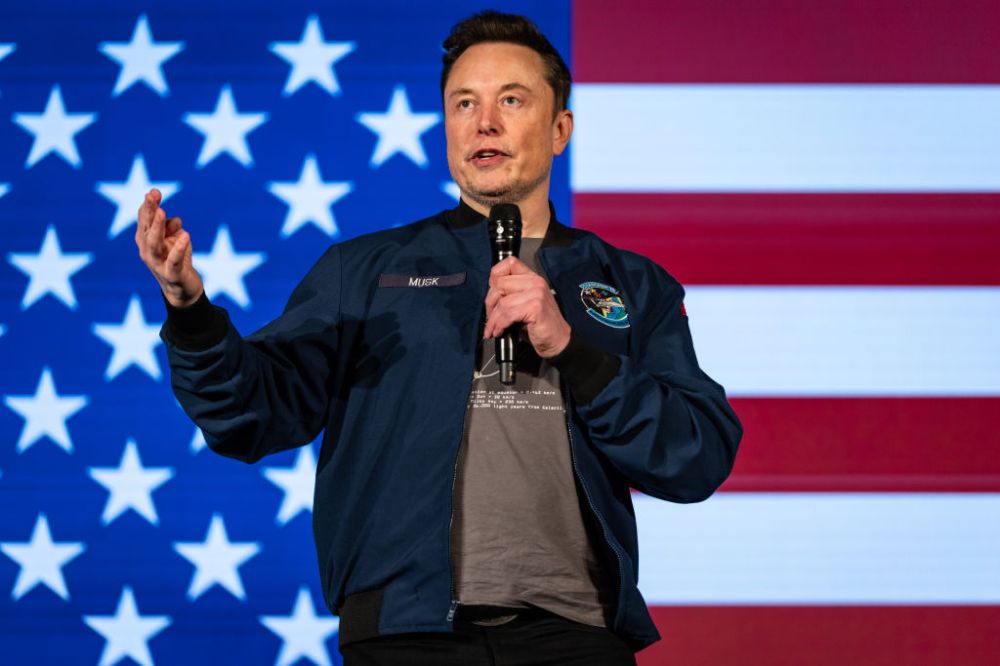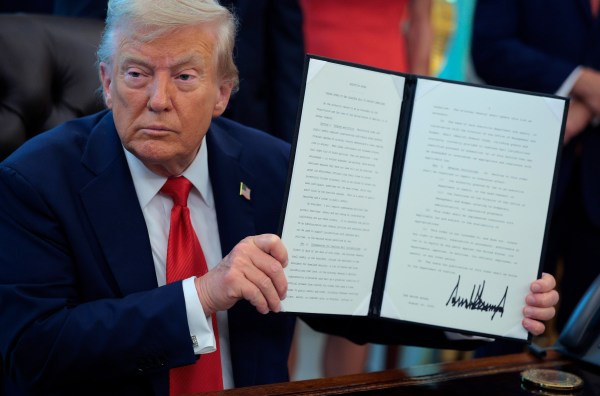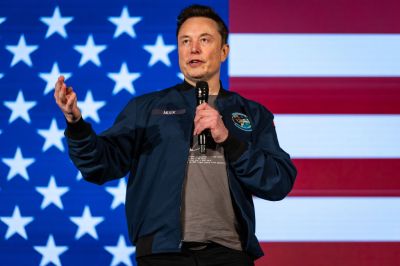A populist coalition led by billionaires is absurd, and so absurdity is unavoidable in its internal squabbles.
That explains how the richest human in history came to spend Christmas this year engaged in a debate that featured observations like “why are people in India still sh–ting in the water they bathe and drink from?”
It began on Sunday when Donald Trump named Sriram Krishnan as a senior White House adviser on artificial intelligence. Krishnan is a venture capitalist, an Elon Musk ally, and a U.S. citizen. But he was born and educated in India and has called for lifting country caps on American green cards.
As that fact circulated on Twitter, holiday cheer among the populist right began to sag. “Did any of yall vote for this Indian to run America?” one user asked alongside a photo of Krishnan.
Setting aside that serving as a “senior White House adviser on artificial intelligence” is a far cry from “running America,” the next 48 hours devolved into a remarkably bitter gang war over high-skilled immigration between grassroots MAGA OGs on one side and Silicon Valley Trumpists like Musk and David Sacks on the other. Krishnan and his country of origin were the target of numerous racist jabs, leading some Indian immigrants looking on to wonder if their alliance with the GOP had been a mistake. At one point Matt Gaetz, whose nomination for attorney general had been touted by Musk, jumped in to warn “tech bros” that their membership in the right’s coalition didn’t entitle them to set immigration policy.
Elon, for his part, took to penalizing the Twitter accounts of some of his right-wing antagonists (whence free speech?) and publicly agreed with a poster who joked that the tech industry needs top engineers from overseas because Americans are too “retarded” to fill those jobs. “This was eye-opening,” he went on to say of the right’s backlash to Trump hiring Krishnan.
Which is only true, of course, if you’ve had your eyes closed.
Trump has built a coalition of hawks and doves, fat cats and working stiffs, protectionists and free-marketeers, liberals and postliberals—but I’m not sure it’s possible to pitch a political tent large enough to accommodate Laura Loomer and the guy who runs Tesla and SpaceX, who was once an immigrant himself. “America First” is the core of Trumpy populism, the movement’s raison d’être; it can’t co-exist with rival ideologies as easily as the others I’ve named. Nativism or “globalism”: Eventually you have to choose.
It was a Christmas bummer for all sides of the triumphant MAGA movement during what should have been a moment of holiday exultation, toasting Donald Trump like George Bailey at the end of It’s a Wonderful Life.
Then Vivek entered the chat.
Jocks and nerds.
Vivek Ramaswamy is an entrepreneur, the son of Indian immigrants, and co-chair with Musk of Trump’s new advisory body on government efficiency, so one can understand why he felt obliged to join the debate over high-skilled immigration and take sides with Team Elon.
But he was certain to do more harm to his cause than good.
On Thursday morning, he uncorked a part-rant, part-pep talk criticizing American culture for celebrating jocks instead of nerds and, more generally, for supposedly “venerating mediocrity over excellence.” Instead of “wallowing in victimhood,” he urged Krishnan’s critics to emulate the ruthless educational ethic many immigrant parents instill in their children. If kids in the U.S. spent less time socializing and more time (or all of their time, even!) studying, Ramaswamy argued, they’d be more competitive with foreign students and American companies wouldn’t need to depend so heavily on H-1B visas.
That advice was … not received warmly. And no wonder.
For one thing, it’s dubious on the merits. As others have noted, American culture is probably more welcoming to nerds than it’s ever been. American children in the age of smartphones aren’t socializing too much but too little. And cultures that have mainstreamed the sort of “grindset” that Ramaswamy idealizes have paid for it with serious social pathologies. No one would want to live in a nation of Viveks (and increasingly, no one does).
Color me skeptical as well that “Trump’s election hopefully marks the beginning of a new golden era in America, but only if our culture fully wakes up,” as Ramaswamy puts it. You don’t elect a boorish, lazy con artist because you’re itching to make America’s schoolchildren hit the books. You elect him because you’ve given up on addressing your problems seriously and are hoping to solve them with magic beans. Trump 2.0 will not turn rural America into South Korea.
Be more like me is weird advice, frankly, from a guy like Vivek who’s famously dislikable. Populists can overlook that when he’s firing at their political enemies, as he normally is, but when he turns his guns on them, the natural human instinct to want to stuff him into a locker will assert itself. His old enemy and fellow Indian American, Nikki Haley, couldn’t resist piling on. “There is nothing wrong with American workers or American culture,” she scolded him after he published his rant. “All you have to do is look at the border and see how many want what we have. We should be investing and prioritizing in Americans, not foreign workers.”
I’ll bet this gift-wrapped opportunity to out-populist Ramaswamy was the nicest Christmas present Haley received this year.
Vivek also happens to be a graduate of Harvard and Yale and very much sounds like it. The grassroots right has an almost limitless tolerance for hyper-elite educational credentials in their leaders so long as they’re mouthing cringy faux-populist platitudes, as Ted Cruz and Josh Hawley’s careers regularly remind us. But on rare occasions when those platitudes stop, the tolerance might also. Many MAGA types who’ve suspected Ramaswamy all along of secret “elite” sympathies by dint of his background may have felt those suspicions confirmed by seeing him deride Americans as “mediocre.”
Vivek also lacks the sort of credibility that Musk enjoys in lecturing to Americans about the virtues of foreigners. However much one might righteously hate Musk for his journey into populist nihilism, SpaceX and Tesla—and the unfathomable fortune they’ve generated—are impressive enough that one can’t help but respect the man in charge for his achievements. If Elon thinks America’s tech industry requires high-skilled immigration, well, it’s hard to argue with success. Ramaswamy, on the other hand, made his money off of an IPO by a biotech company whose main product ended up failing abysmally. He’s less a visionary hero than he is a hustler.
On top of all that, Vivek was inescapably handicapped in this debate by the fact that, ethnically, postliberals will regard him as part of the “Them” and not the “Us.” If you’re the sort of populist who’s forever questioning whether those who disagree with your policies truly wish to put America first, seeing an Indian American go to bat for hiring Indian engineers will raise your hackles.
The strangest thing about Ramaswamy’s rant, though, was how anachronistic it felt.
At heart, it was an old-school conservative lament about taking personal responsibility for bettering oneself and one’s family instead of blaming an unfair culture. A certain future vice president of the United States—whose own children are Indian American—made the same point in his best-selling book, although he eventually ditched that attitude and began demagoging immigrants once he realized that populism as a mode of right-wing politics was here to stay. “Pull yourself up by your bootstraps” is as dead as Reaganism. “The system is rigged” is what sells.
J.D. Vance came to realize that the path to political power in the modern GOP lay in grievance and scapegoating. I thought Ramaswamy had realized it too, but the last thing a movement of Real Americans wants to hear from someone whose own “Real American” cred is questionable is that they’d better buckle down if they want to hack it against kids from the third world.
“Imagine if [Kamala] Harris had said during the campaign that her mom’s Indian culture was superior to America’s because here we spend too much time celebrating toxic men like Riggins from Friday Night Lights,” Tim Miller said of Vivek’s rant. “Trump would’ve won New Jersey.” Indeed. Hillary Clinton’s jab at the “deplorables” in Trump’s coalition in 2016 caught on because it seemed to channel the perceived contempt that Democratic “elites” feel for Real America. Now here was Vivek Ramaswamy, alleged MAGA populist, sounding more than a little contemptuous of deplorable mainstream American culture himself.
Who’s the boss?
Guessing which side Trump will take in this matter is trickier than usual.
On the one hand, he proved during his first term that he’s willing to limit high-skilled immigration. He also dislikes being on the wrong side of his base when they’re in a lather, as last week’s revolt against the government funding bill showed. And one of his most influential advisers is prone to saying things like “America is for Americans and Americans only.”
Many Trump supporters seem to be under the impression that he’s interested only in reducing illegal immigration. They are mistaken.
On the other hand, Trump owes Elon Musk for helping to get him reelected. He’s also made quite a few “friends” lately among tech bigwigs and corporate pooh-bahs, who’ve lavished cash and attention on him since Election Day. And he does seem to appreciate the economic benefits of attracting foreign talent to the United States. Remember, as recently as this past June, he told the All-In podcast that any immigrant who graduates from an American college—or even a junior college!—should receive a green card with their diploma.
All-In is hosted by four well-known Silicon Valley investors, by the way, one of whom is David Sacks.
The political considerations for Trump also make his preference hard to predict. I can imagine him cracking down on H-1B visas to appease populists if his mass deportation effort underperforms, which it probably will. Border czar Tom Homan has already begun telling aides to prioritize removing convicted criminals and immigrants with pending orders of deportation; ardent border hawks who swallowed the magic beans about deporting 10 million people will be bitterly disappointed if that’s as far as the effort goes. To cheer them up, the administration might opt to protect Real America by blocking legal paths to entering the country as well.
But it could also go the other way. Forced to choose between betraying grassroots MAGA fanatics by allowing high-skilled immigration and betraying his new admirers in the corporate-gazillionaire class by blocking it, Trump might reasonably conclude that he’s better off betraying the former. They’re cultists; unlike Elon and his cohort, there’s zero risk that they’ll ever turn on him. Besides, admitting high-skilled immigrants into the U.S. is very popular even among Trump supporters. Laura Loomer can and will say Laura Loomer-y things on the subject on Twitter, but even most America First-ers see the economic virtue of snatching up other countries’ talent.
Trump’s second term is likely to end up as a sustained argument among his supporters over precisely which immigrants should and shouldn’t be barred from the U.S. Think of it as a game called “Not Those Immigrants.” Should we bar criminal illegals? Sure. Should we bar noncriminals? No, not those immigrants. How about illegals working agricultural jobs? No, not those immigrants. Maybe illegals working in construction? No, not those immigrants. Hospitality, maybe? No, not those immigrants.
The debate playing out on Twitter this week is an unusually public round of “Not Those Immigrants” featuring unusually prominent people and involving unusually skilled labor. The point of the MAGA movement is to prevent Real Americans from being usurped by their cultural and economic enemies. Imagine the surprise among its members to find one of their new heroes, Elon Musk, suddenly arguing in favor of usurpation.
There’s an element of political usurpation to it too. In complaints like Gaetz’s you’ll find a whiff of resentment toward “tech bro” latecomers to Trump’s coalition for presuming to tell cultural populists who were MAGA from the start what their immigration policy should be. That resentment is silly insofar as even new members of a party have a right to try to influence its agenda. But having the mega-rich pile into a nationalist movement and try to get its followers excited about foreign labor is like Hayekians taking over the local communist party and making its platform anti-union.
The postliberal populist project is one of redefinition—of the right broadly, of the Republican Party specifically, and ultimately of what it means to be an American. To have outsiders come in and try to coopt that project by redefining it right under their noses must be a special affront.
I wonder if it will end up coloring how Trump supporters view Musk, Ramaswamy, and their work on slashing government spending as head of the new Department of Government Efficiency (DOGE).
It’s a cinch that their recommendations for eliminating federal jobs won’t go far enough to suit MAGA diehards who are keen to purge the federal bureaucracy of unfriendly civil servants, but until this week they needn’t have worried that their good intentions would be questioned. Elon in particular is—or was—at the height of his power as a right-wing influencer, the first person since 2015 beside you-know-who to demonstrate a willingness and ability to intimidate congressional Republicans into doing his bidding.
Now, suddenly, he’s taken sides with Them against Us. Having done so, his work for DOGE might come to be seen on the right in a more sinister light than it otherwise would have been.
It’s already begun. “Is DOGE a way to cut ‘spending’ or REDIRECT the spending toward the projects of tech bro billionaires?” Loomer wondered amid the debate over the Great Indian Replacement. As Musk increasingly annoys Trump by muscling into his spotlight, finds himself alienated from nativists over H-1B visas, and ends up being demagogued by suspicious populists for some of DOGE’s fiscal prescriptions, there’s a chance that this unlikely political marriage will end very, very badly. A populist coalition led by billionaires isn’t just absurd, it turns out. It might be unsustainable.







Please note that we at The Dispatch hold ourselves, our work, and our commenters to a higher standard than other places on the internet. We welcome comments that foster genuine debate or discussion—including comments critical of us or our work—but responses that include ad hominem attacks on fellow Dispatch members or are intended to stoke fear and anger may be moderated.
With your membership, you only have the ability to comment on The Morning Dispatch articles. Consider upgrading to join the conversation everywhere.